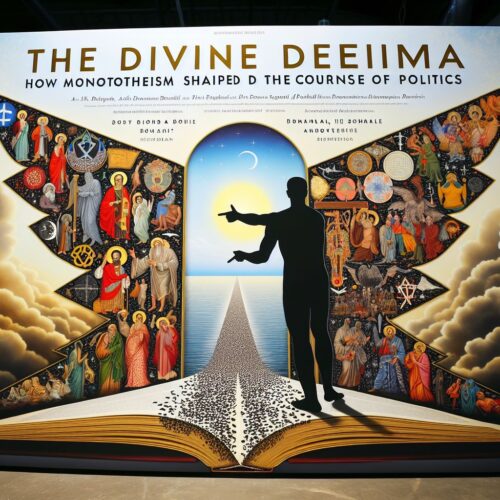From ancient civilizations to modern nations, the intersection of religious belief and politics has been a potent force shaping the world. Monotheistic religions, with their emphasis on the worship of a single deity, have played a pivotal role in influencing political systems, policies, and societal norms. Navigating Faith and the Future, this article delves into the complex relationship between monotheism and politics, exploring the moral dimensions, implications, and historical impacts that continue to reverberate today.
Divine Authority, Earthly Power
Monotheism, by definition, centers around the belief in and worship of a single supreme deity. This notion of a higher power wielding ultimate control over the universe has profound implications when applied to political systems. Throughout history, rulers and governments have capitalized on the concept of divine authority to legitimize their power and establish a moral framework for governance.
Theocracies, such as ancient Egypt or the medieval Papal States, saw religious leaders assume both spiritual and political roles, ruling in the name of the divine. In these societies, religious texts, such as the Bible or the Quran, served as the basis for laws and regulations, effectively intertwining religious dogma with political governance. While this fusion may appear harmonious and cohesive, it raises important questions about the limits of power, the role of dissent, and the potential for oppression.
The Clash of Loyalties
Monotheistic religions, with their mono-focus on a single deity, often encourage a sense of unity and loyalty among believers. However, when this unity intersects with political power, conflicts can arise. Throughout history, religious divisions have fueled wars, rebellions, and political schisms.
The Protestant Reformation in Europe, ignited by religious differences between Catholics and emerging Protestant sects, challenged the dominant political and religious order. This seismic event fundamentally reshaped the political landscape of Europe, charting new paths for governance and sovereignty. Similar clashes between Shia and Sunni Muslims drive much of the political instability in the Middle East today, as religious divisions intertwine with geopolitical interests.
The Moral Utopia or Justification for Ills?
Monotheistic beliefs provide a powerful moral framework, with a clear dichotomy between good and evil. This moral compass can shape political ideologies, policies, and practices, but can also be manipulated or misused. History has witnessed both inspiring acts of righteousness inspired by monotheism and abhorrent acts carried out under its guise.
Movements like the abolition of slavery, the civil rights movements of the 20th century, or the fight against apartheid drew strength from religious convictions, often rooted in monotheistic faiths. At the same time, religious extremism and theocracy have been used to justify oppression, persecution, and violence. The divergent outcomes highlight the dual nature of monotheism’s influence on politics – a source of inspiration or a tool for manipulation.
The Contemporary Landscape
In our modern world, democracy and secularism have become dominant forces, often seeking a separation of religion and politics. Nevertheless, the influence of monotheistic beliefs persists. Discussions around issues like reproductive rights, marriage equality, and social justice are often shaped by religious arguments rooted in monotheistic traditions.
Navigating the complexities of religious beliefs, political power, and individual freedoms requires nuanced approaches that respect diverse viewpoints. Acknowledging the historical impact of monotheism on politics while pondering its place in the present and future invites critical reflection and fosters an enlightened dialogue.
Conclusion: Beyond Divine Monopoly
The intertwining of monotheism and politics spans continents, epochs, and civilizations. The legacy of this relationship is both a source of inspiration and a cautionary tale. As we navigate the complexities of the modern world, recognizing the profound influence of monotheistic beliefs on politics is essential. By fostering an inclusive public square that values rational discourse and respects diverse viewpoints, we can move toward a future where the moral insights offered by monotheism can coexist with individual freedoms and shared democratic values.
